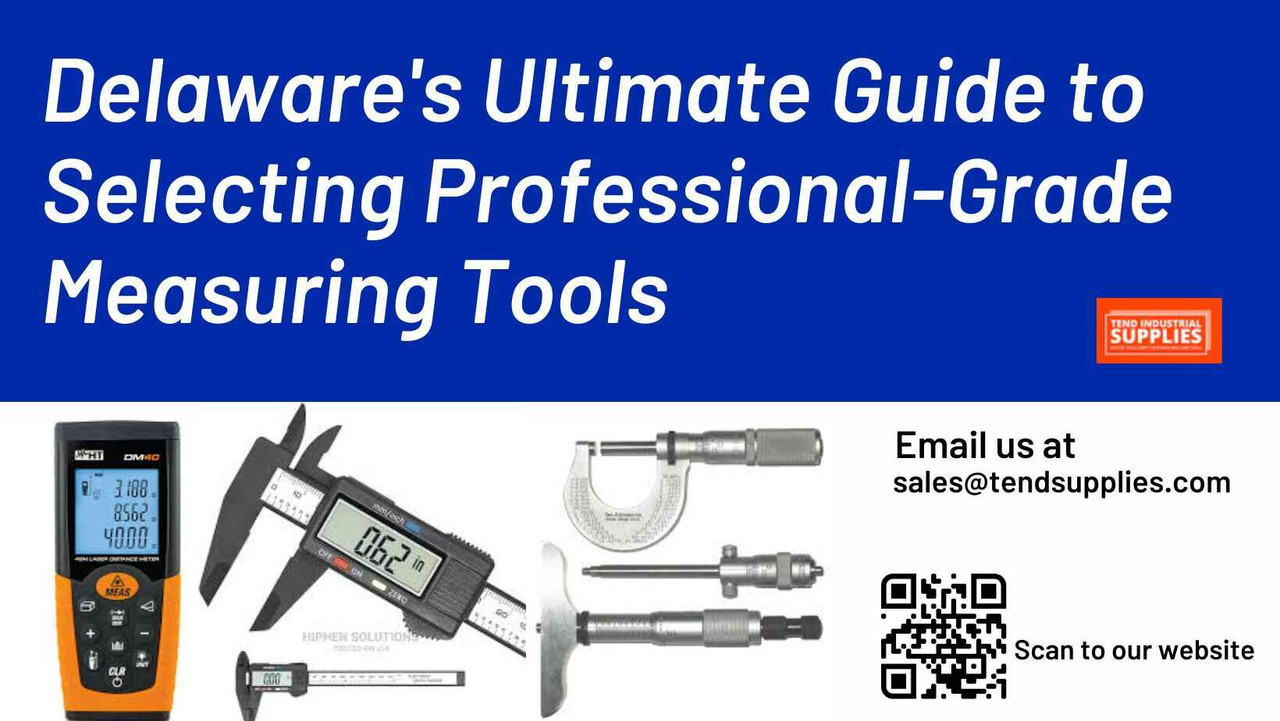Delaware's Ultimate Guide to Selecting Professional-Grade Measuring Tools
Key Takeaways
- Invest in high-quality, professional-grade measuring tools suited for Delaware's industries and climate
- Consider accuracy requirements, environmental conditions, and frequency of use when selecting tools
- Establish regular calibration and maintenance routines to ensure continued accuracy
- Leverage digital and smart measuring technologies to enhance efficiency and data management
- Proper tool selection and care can significantly improve product quality and business reputation
Introduction
The importance of precise measurements cannot be overstated in Delaware's diverse industries, from manufacturing to construction and engineering. Professional-grade measuring tools are the backbone of quality work, ensuring accuracy, consistency, and compliance with industry standards.
This comprehensive guide will help Delaware professionals select the best measuring tools for their specific needs, enhancing productivity and maintaining the highest standards of workmanship.
The Importance of Precision in Delaware's Industries
Delaware's economy relies heavily on industries where precision is paramount:
- Advanced manufacturing
- Chemical and pharmaceutical production
- Aerospace and defense
- Construction and infrastructure development
- Engineering and technical services
In these fields, even the slightest measurement error can lead to significant consequences, including:
- Product defects
- Safety hazards
- Regulatory non-compliance
- Increased costs due to waste and rework
- Damage to professional reputation
Investing in high-quality, professional-grade measuring tools is not just a matter of preference—it's a necessity for success in Delaware's competitive business landscape.
Essential Professional-Grade Measuring Tools for Delaware Professionals
1. Digital Calipers
Ideal for precise measurements of internal and external dimensions.
Key features to look for:
- High resolution (0.01mm or better)
- Multiple measurement modes (inch/metric)
- Data output capability for quality control documentation
Recommended model:
2. Laser Distance Meters
Perfect for quick and accurate long-distance measurements in construction and surveying.
Key features:
- High accuracy (±1/16 inch or better)
- Long range (at least 100 feet)
- Multiple measurement functions (area, volume, etc.)
Recommended model: Bosch GLM 50 C Bluetooth Laser Distance Measure
3. Precision Levels
Essential for ensuring levelness and plumb in construction and manufacturing.
Key features:
- High accuracy (0.0005 inch/foot or better)
- Durable construction for jobsite use
- Multiple vial orientations for versatility
Recommended model: Enegyz YG268 Gloss meter high-end precise measurement triple angle 20 60 85 Degree
4. Micrometers
For ultra-precise measurements in manufacturing and quality control.
Key features:
- High accuracy (0.0001 inch or better)
- Smooth operation for consistent readings
- Ratchet stop for consistent measuring pressure
5. Multimeters
Essential for electrical measurements in various industries.
Key features:
- True RMS for accurate AC measurements
- Auto-ranging capability
- Safety certifications (CAT III or higher)
Recommended model: FLUKE 15B Digital multimeter for AC/DC
Choosing the Right Measuring Tools for Your Delaware Industry
Consider these factors when selecting professional-grade measuring tools:
- Accuracy requirements: Determine the level of precision needed for your specific applications.
- Environmental conditions: Choose tools that can withstand Delaware's varied climate, from humid summers to cold winters.
- Frequency of use: Invest in durable tools for frequent use, balancing quality with budget.
- Calibration and maintenance: Consider tools with easy calibration processes and local support.
- Data management: Look for tools with data output capabilities for integration with quality control systems.
Maintaining Accuracy: Calibration and Care
To ensure continued accuracy:
- Establish a regular calibration schedule
- Use protective cases for storage and transport
- Clean tools after each use, especially in dusty or corrosive environments
- Train staff on proper handling and use of measuring tools
- Keep detailed records of calibration and maintenance activities
Learn more about tool maintenance in our article on Workshop Tool Maintenance: Keeping Your Hand Tools in Top Condition.
Leveraging Technology: Digital and Smart Measuring Tools
Embrace the latest advancements in measuring technology:
- Bluetooth-enabled tools for seamless data transfer
- Augmented reality measuring apps for smartphones
- Cloud-based data management systems for team collaboration
- 3D scanning technology for complex measurements
These technologies can significantly enhance efficiency and accuracy in your Delaware business.
Investing in Quality: The Long-Term Benefits for Delaware Professionals
While professional-grade measuring tools may have a higher upfront cost, the benefits far outweigh the initial investment:
- Improved accuracy leads to higher-quality output
- Reduced errors mean less waste and rework
- Enhanced reputation for precision and reliability
- Increased efficiency in measurement tasks
- Compliance with industry standards and regulations
FAQs About Professional-Grade Measuring Tools for Delaware Industries
1. How often should I calibrate my measuring tools in Delaware's climate?
Calibration frequency depends on usage and environmental conditions. Generally, precision tools should be calibrated every 6-12 months or more frequently in harsh conditions or for critical applications.
2. Are digital measuring tools more accurate than analog ones?
Digital tools often offer higher resolution and eliminate parallax errors, but high-quality analog tools can be equally accurate when used correctly. Choose based on your specific needs and preferences.
3. Can I use the same measuring tools for both indoor and outdoor work in Delaware?
While many tools are versatile, consider environmental protection ratings for outdoor use. Look for IP-rated tools that can withstand moisture and temperature fluctuations common in Delaware.
4. What certifications should I look for when purchasing professional-grade measuring tools?
Look for tools certified by recognized bodies such as NIST (National Institute of Standards and Technology) or ISO (International Organization for Standardization). These certifications ensure traceability and adherence to industry standards.
5. How can I ensure my team is using measuring tools correctly and consistently?
Implement regular training sessions, create standard operating procedures, and conduct periodic audits of measurement practices. Consider appointing a measurement quality champion within your team.
Conclusion
Ready to elevate your measurement capabilities with professional-grade tools tailored for Delaware's industries? Contact our experts at Tend Industrial Supplies or send us an email sales@tendsupplies.com we answer all inquires promptly









